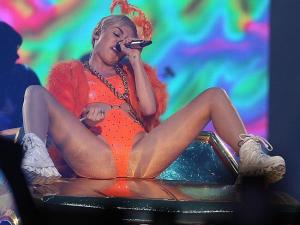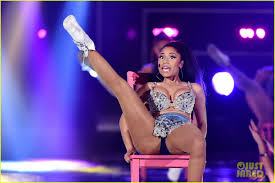Am I the only one who thinks that, while there’s certainly no question about Miley Cyrus’s musical talent, there’s just not a whole lot to admire about the 21 year old star’s transformation from a childhood star to a racy, over sexualised nympho parading on stage with a gyration belonging more to a seedy Men’s club than a stage at Rod Laver Arena?
It seems she’s just another in a long series of female artists who have learnt that sex sells records, but it’s no longer enough to dish out a few racy moves in a short skirt, surrounded by male dancers while flirting suggestively at the camera, it’s now imperative to lose it all while pantomiming sex moves with anyone and everyone on stage, and to have a very good bikini line waxer.
Far from being individual and unique, I see her as a conformist. She is someone who has followed the road much travelled, kicking up the dust left by Madonna, Britney, and Christina before her, among others.
This is not intended to be a rant against Miley Cyrus. She’s a talented, assured musician, but why not let her musical talent do the talking, rather than compensating with all the twerking and stripping?

Cameron Adams, the well known music critic, asked the same question in a timely piece published in the Sunday Herald Sun last week. He also asked this: ‘are female stars slipping too far down the pole towards Stripper Pop?’
Absolutely they are.
Far from being a prude who’s confronted by the likes of Rihanna parading around in next to nothing, I must say that I can’t help but look twice, or three times. But I wonder if these stars are really doing a social good for the schools of teenagers who adore them unquestionably. Particularly, in an age when young women have been told that they are more than just their beauty and their sexual currency, how many adolescents grow up believing that it’s okay to portray themselves as dance mad nymphos hot for group sex, girl on girl action and S&M bondage?
Following the careers of our current pop stars, it’s almost like the transition from childhood innocence to singer-stripper is a rite-of passage. Just look at Britney Spears, Christina Aguilera and Lindsay Lohan. Each followed a similar road in the trek from child star to racy entertainer, and while the sales rolled in (at least for the first two) the Madonna-esque sexualisation of music continued to challenge new boundaries.
Rihanna’s chains and whips, Nicki Minag’s booty, Lady Gaga’s exhibitionism; an MTV countdown is a fine window into the musical raunch culture that has manufactured a popularised, one dimensional idealisation of sexuality. Guys are the pimps, and girls are the desirable, frisky targets who seduce multiple prey in a carefully choreographed orgy, dancing to the beat and bass of the latest popular DJ.

This argument is nothing new. Countless writers have been concerned with the sexualisation of popular culture. Many have been rebuked with the claim that it’s ‘liberating.’ Sure, it might be a liberating experience for the singer who has discovered the pleasure that comes with confident exhibitionism, but the wider cultural message could be misconstrued to one that celebrates lyrics inspired by the sex industry, and where a girl’s value comes from revealing their flesh and offering themselves in service to men.
Is it really empowering when the prevailing wisdom of the day is that for artists to sell records, especially women, then sex sells? Is it really empowering when what matters more is the presentation, rather than the musical product? The attention is drawn away from the voice and the musical talent, and focused firmly on the artist’s appearance. Such a mindset flies in the face of the counter message that what matters more in life is someone’s character.
Would it be a stretch to link the advent of sexting, binge drinking and increased teenage drug use to the prevailing musical culture that celebrates hyper sexual activity and hedonistic partying with a fine cocktail of alcohol and drugs?
I don’t believe I’m being a wowser by asking such a question.
It’s an interesting age we live in. Last week, on a single facebook feed, I witness viral indignation and offense at infamous American blogger Roosh V’s claim that ‘A woman’s value significantly depends on her fertility and beauty. A man’s value significantly depends on his resources, intellect, and character.’ Yet in the same feed I see links to video clips that emphasise a woman’s sexual currency and her physical prowess, while the men are seemingly enhanced by their ability to draw multiple women to their persona while they’re adorned with multiple bling with pimped up cars roaring in the background.
In our choice of idols, do we inadvertently lend support to the values we oppose?





